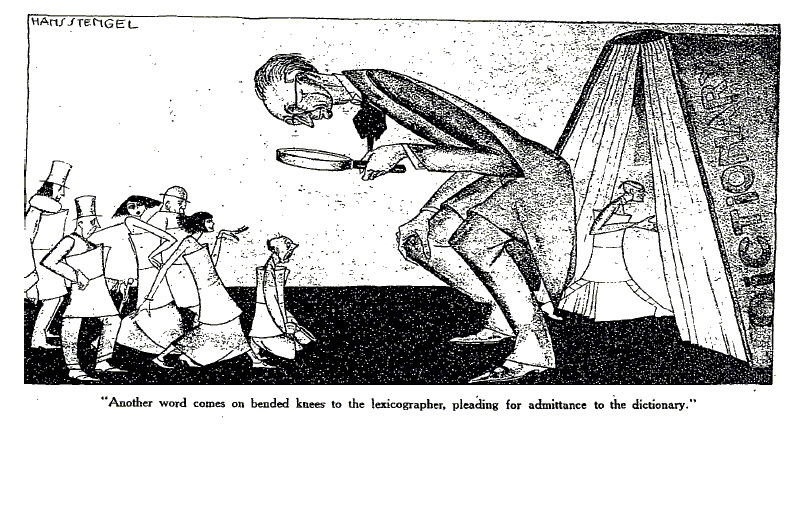Merriam-Webster adds adorkable, ICYMI
« previous post | next post »
…and 368 other words, in its September 2022 New Words list.
This is a close as we now get to a genuine "Word Induction Ceremony", as imagined on Comedy Central in 2008 (see "Ozay, dot-nose, kangamangus", 12/5/2008).
Some version of the vetting process has of course been in place as long as dictionaries have existed, as described by F.A. Austin in 1923 ("Getting into the English Dictionary; Every New Word Must Pass an Inquisition to be Admitted to the Select 500,000", NYT 6/3/1923), with this illustration [cited here by Ben Zimmer]:
The links in Ben Zimmer's 2008 post have all succumbed to bit-rot, but the episode in question (The Sarah Silverman Program, S2 E 15) is currently available from Paramount.
See also "Lumpatious lexicography", 1/13/2014.

Andreas Johansson said,
October 3, 2022 @ 5:55 am
Some of those words I'd expected to be in dictionaries since decades by now.
[(myl) I agree. But in fairness to MW, they often indicate the antiquity of the new admits, e.g. false negative, where they cite a first use in 1916.
(Though a quick Google Books search suggests earlier uses as well…)]
VVOV said,
October 3, 2022 @ 6:35 am
One wonders how they decide that multi-word phrases achieve sufficient word-ness? syntactic atomicity? to receive their own entry. Presumably MW lexicographers were aware of the term “false negative” before 2022, but just didn’t feel it needed an entry separate from that of “false” and “negative”.
bks said,
October 3, 2022 @ 7:11 am
Maybe they took notice of the "type 1 error" and type 2 error" errors.
bks said,
October 3, 2022 @ 7:13 am
And the quotation mark typo errors.
J.W. Brewer said,
October 3, 2022 @ 7:50 am
I was glad to see they added "false positive" at the same time as "false negative," because it would be odd to treat one but not the other as lexicalized or "dictionary-worthy." Other two-word items of some considerable antiquity that were added this year include "mud season" (first attested 1832, they say*) and "supply chain" (first attested 1948, they say). Pop-Whorfians may be interested to learn that (if you believe wikipedia) certain East Slavic languages have single lexemes for "mud season," with the Russian being распу́тица and the Ukrainian being бездоріжжя.
*On the other hand, the well-known Frost poem is titled "Two Tramps in Mud Time," and the google n-gram viewer indicates that it is not until circa 1970 that "mud season" definitely pulled away from "mud time" to become the much more common phrase.
David L said,
October 3, 2022 @ 10:10 am
Further to AJ's remark, I'm surprised to see 'dawn chorus' in the list. I've known that expression since I was a child. and that was a long time ago.
Bloix said,
October 3, 2022 @ 4:15 pm
if I were the Lexicographical King, I would impose a rule: if the first word of the compound merely the modifies an existing meaning of the second word, I would deny admission. But if the compound names a different thing, I would admit it. So: sea horse, jew's harp, egg cream, red herring, sugar soap, atmospheric river – in. False positive, disc brake, graph paper, pea protein – out.
[Some compounds aren't clearly in one category or the other. For those I would use my royal discretion.]
[(myl) But perhaps the commonest case is one where the meaning of the compound is a particularization of the range of available compositional meanings. The classical examples include things like "olive oil" vs. "hair oil", or "spark plug" vs. "drain plug", or "ski lift" vs. "face lift", or "ear wax" vs. "moustache wax". All such N1 N2 compounds name a type of N2, but the details require additional lexical knowledge.
This emerges clearly in translations, where e.g. "spark plug" is "bougie d'allumage" in French, but "drain plug" is "bouchon de vidange"; or "ski lift" is "télésiège" while "face lift" is "lifting".
The degree of particularization varies, as does its predictability given world knowledge. But there's not a bright lexico-regal line here, in my opinion.]
Chas Belov said,
October 5, 2022 @ 7:30 pm
Hobbyist here. I'd think the issue would be that "false" would apply only to a certain meaning of "negative" or "positive", not to all such meanings. For instance, I don't believe you could use it with reference to a photographic negative.
Francis Boyle said,
October 11, 2022 @ 7:41 am
The way I parse it, both 'false' and 'negative are adjectives modifying an implied noun ('result' or something similar) so any compositional meaning is ruled out from the start.